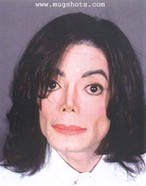
At the time I’ll Be There was the number one hit on the airwaves, I found the kid who piped it out endearing—but I was also uncomfortable with having a boy whose voice was nowhere near being ready to change singing about mending broken adult romantic dreams. The term “inappropriate” wasn’t in common use then, but I felt distinctly squirmy about his position. I wondered what effect it might have on the development of a child to be put in such an unnaturally quasi-adult role.
Years later, looking at what Michael Jackson grew up to be, I not only had an answer, I had a significant change of attitude regarding him. Now the indifference mixed with scornful amusement I had previously felt for Jackson just seemed callous.
One of the first things I began to understand was the mincing, wispy manner that Jackson adopted as he grew older. As a child star, he had seemed very much a normal, healthy, red-blooded American boy. In fact, although his voice was squeaky-high, there was something unmistakably ballsy in the power of his delivery. What had happened to this in his later life?
For the answer, it’s not necessary to look any further than what he was being asked to do in songs like I’ll Be There.
Whenever a male sings a love song, what he’s doing, on at least one emotional level, is seducing the female members of his audience. Michael Jackson was just a little kid, but he was being put in a position where his job was to seduce grown women.
Yes, the fact that he was a child did give a poignantly pure and unspoiled quality to the song’s message of rekindling belief in dreams. But using a prepubescent boy as the focal point for grown women’s desires to recapture their own romantic innocence is not exactly the kind of thing you’ll find recommended in parenting books.
And let’s not mince words about what was going on in his interactions with the audience. The women may have cooed and gushed about wanting to pinch the cheeks of such an adorable little boy, but the hard truth is, they wouldn’t have squealed and sighed the way they did if he had not also moved them on another level (perhaps not even consciously acknowledged) with the striking male energy of his performance.
Considering Michael Jackson’s later behavior in light of this experience, is there anything inexplicable about a boy who was, in effect, “turned out” as a kind of symbolic gigolo to vast hordes of adult women before his voice had even changed trying afterward to in some way reclaim his lost innocence?
Was it really all that surprising for him to shut down the dynamic ballsiness by which he had sold himself—even to the point of taking on a kind of demure manner that is more commonly associated with virgin girls?


